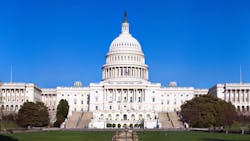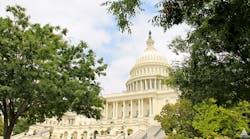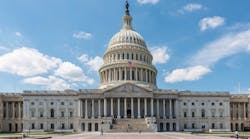House Appropriations Committee approves FY21 THUD bill; full House consideration expected next week
The House Appropriations Committee approved the fiscal year 2021 Transportation, Housing and Urban Development, and Related Agencies (THUD) bill on a vote of 30 to 22.
“This year’s THUD bill represents a renewed commitment to improve safety, produce more affordable housing, upgrade our aging transportation networks, and bolster our nation’s resiliency to a changing climate,” said House Appropriations Subcommittee on Transportation, Housing and Urban Development, and Related Agencies Chairman David Price.
The THUD bill would provide the Federal Transit Administration (FTA) with $18.9 billion in FY21 and the Federal Railroad Administration (FRA) would be provided $3 billion of which more than two-thirds would be dedicated to Amtrak appropriations.
The FY21 THUD bill is consistent with the Investing in a New Vision for the Environment and Surface Transportation in America (INVEST in America) Act and includes budgetary resources for surface transportation programs totaling $78.7 billion. The INVEST in America Act, a five-year surface transportation proposal, passed the House and is awaiting action in the Senate.
The FY21 THUD appropriations proposal includes $75 billion in emergency funding relief to support the economic recovery from the coronavirus pandemic by investing in our nation’s transportation and housing infrastructure. Of the $75 billion, approximately $21 billion would apply toward rail and transit. On July 14, a coalition of transit agencies joined to rally support for between $32-$36 billion in additional emergency aid.
What’s included:
• $1 billion for National Infrastructure Investments (TIGER/BUILD)
• $3 million to support the Highly Automated Systems Safety Center of Excellence established in fiscal year 2020.
• $10 million for Transportation Planning Grants to assist areas of persistent poverty.
• $3 billion for FRA
o $500 million for Consolidated Rail Infrastructure and Safety Improvements, an increase of $175 million above the FY 2020 enacted level and $170 million above the President’s budget request.
o $200 million for Federal-State Partnership for State of Good Repair, equal to the FY 2020 enacted level. The President’s budget request proposed eliminating this program.
o $2.05 billion for Amtrak, an increase of $50 million above the FY 2020 enacted level and $1.1 billion above the President’s budget request.
- $750 million for Northeast Corridor Grants, an increase of $50 million above the FY 2020 enacted level and $424.5 million above the President’s budget request.
- $1.3 billion for National Network Grants, equal to the FY 2020 enacted level and $689 million above the President’s budget request.
• $18.9 billion FTA
o $15.9 billion, consistent with the INVEST in America Act, for Transit Formula Grants funded from the Highway Trust Fund, an increase of $5.8 billion above the FY 2020 enacted level and $4.9 billion above the President’s budget request.
o $2.2 billion for Capital Investment Grants, equal to the authorized level, an increase of $197 million above the FY 2020 enacted level, and $286 million above the President’s budget request.
o $510 million for Transit Infrastructure Grants, equal to the FY 2020 enacted level and $510 million above the President’s budget request.
The U.S. Department of Transportation would be appropriated an additional $26 billion to support the economic recovery from the COVID-19 pandemic. The more than $21 billion for rail and transit would include:
• $3 billion for National Infrastructure Investments (TIGER/BUILD);
• $5 billion for Consolidated Rail Infrastructure and Safety Improvements;
• $5 billion for Northeast Corridor Grants to Amtrak;
• $3 billion for National Network Grants to Amtrak;
• $5 billion for the Capital Investment Grants;
• $100 million for Magnetic Levitation Technology Deployment Program
“The emergency funding in this bill is pivotal to kickstart a strong and equitable recovery from the coronavirus pandemic and the ensuing economic collapse. After an unprecedented year of challenges, the investments in this bill lay the foundations for sustained economic growth and expanded opportunity for every American in every corner of our nation,” said Committee Chairwoman Nita M. Lowey.
One amendment to pass by voice vote during committee markup was introduced by Rep. Price and requires the use of masks and enhanced sanitation measures on airlines, Amtrak and in large transit agencies. Amtrak has required passengers and employees to wear face coverings since May. Transit agencies impacted by the amendment include those that have a population of at least 500,000 and that provided a minimum of 20,000,000 unlinked passenger trips in the most recent year data is available.
“It’s a matter of common sense and it’s a basic consideration for each other,” Rep. Price said during the bill’s mark up.
The full House is expected to take the FY21 THUD bill under consideration late next week.

Mischa Wanek-Libman | Group Editorial Director
Mischa Wanek-Libman is director of communications with Transdev North America. She has more than 20 years of experience working in the transportation industry covering construction projects, engineering challenges, transit and rail operations and best practices.
Wanek-Libman has held top editorial positions at freight rail and public transportation business-to-business publications including as editor-in-chief and editorial director of Mass Transit from 2018-2024. She has been recognized for editorial excellence through her individual work, as well as for collaborative content.
She is an active member of the American Public Transportation Association's Marketing and Communications Committee and served 14 years as a Board Observer on the National Railroad Construction and Maintenance Association (NRC) Board of Directors.
She is a graduate of Drake University in Des Moines, Iowa, where she earned a Bachelor of Arts degree in Journalism and Mass Communication.



